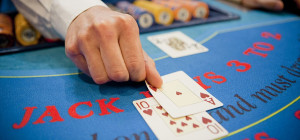 If you are a sharp and perceptive individual, something you learn very early in life is that there are winners and losers. In high school, my art teacher often liked to say, “There has to be a loser, someone has to lose!” We cannot always have what we want; it is a universal law that governs the human race. And I’ll top this intro with, “the kind of gambler who tries to avoid losing instead of trying to win, rarely wins the price” – Hunter x Hunter: episode 10.
If you are a sharp and perceptive individual, something you learn very early in life is that there are winners and losers. In high school, my art teacher often liked to say, “There has to be a loser, someone has to lose!” We cannot always have what we want; it is a universal law that governs the human race. And I’ll top this intro with, “the kind of gambler who tries to avoid losing instead of trying to win, rarely wins the price” – Hunter x Hunter: episode 10.
Are you the kind of gambler who avoids losing or the one that tries to win?
Betting standards play a crucial role in determining whether a gambler will win a bet. Furthermore, they are the foundation of the life of a gambler. When gambling actually began is uncertain, but there is a good chance that it is something that has been around for as long as humanity has existed. We are risk takers and we have this innate desire to want to know and tell the future. Nonetheless, gambling is risky business and risk’s best friend is peril.
When you place a bet, it means you have come to terms with the possibility that you may lose something. After all, some of the world’s most successful people are also well-known risk takers. Take Mark Zuckerberg for example, he was offered $1 billion by Yahoo! for Facebook while the company was still young but he rejected the offer. He took a risk and gambled on the fact that he stood to gain much more than what Yahoo! offered. Now he is among the top ten richest people in the world netting over $50 billion. Nevertheless, not everyone is Zuckerberg and please, don’t compare yourself to him. Learn from him but you are NOT HIM.
The principle’s a gambler plays by while making a bet are what will determine his or her success. There are people who die placing bets never having won a single one; perhaps just a few insignificant ones. Conversely, there are people who at some point hit jackpot or often have serious wins. According to betting.org, gambling relies mostly on luck but a good portion of it is strategy, principles, standards!
The first principle you must observe is betting with principle. That means you must have principles or else you are going to destroy yourself. You must have rules, whether good or bad. The good thing with having rules is that they give you something to measure your success. If you are winning, you will know why you are winning. If you are losing, you will know why that is the case. I started the article by giving a clue about the reason behind losing bets and deals. One of the most important principles for gamblers who win is being certain about the manner they are going to bet, what they will bet on, and most importantly, they believe in themselves.
The dicer the deal, the more certain and grounded you should be. It takes just the slightest doubt to make you lose a good deal. However, self-confidence is not something that comes from the ether. The secret to self-confidence and believing in oneself comes from knowledge and experience; in a word, competence.
In the gaming industry, the more you know what you are betting on the higher the chances are that you will make the right decisions. It means you must know as much as possible about your bets and deals. If it is esports, you must know everything about the teams playing; you must know as much as possible about the individual players since a team is as strong as its weakest player; you must, in general, know as much as possible about all the forces influencing the success of a team, a deal, game, or whatever it is you are betting on. This knowledge will give you the resources and capacity to determine how the wind will influence the outcome of the game, enabling you to place the right bets on the right horse.
Some betting standards that you will find useful are:
- Phil’s “Never invest more than you can afford to lose”. Dr. Phil is not a gambler and this principle is more of a financial principle. However, it applies to any situation where you stand to lose a lot. In other words, don’t gamble your life away. If it will significantly adversely affect you emotionally, psychologically, or financially, it is not a good deal. You would be safer asleep at home.
- Self-confidence is a good thing but cockiness (overconfidence) is not. Know your limits; know when it’s time to stop.
- Be careful with external influences. The Huffingtonpost recommends that you should make decisions based on your careful analysis and trust your guts.
- You can’t win them all. Learn from your mistakes and experience.
There are various other principles but you will learn them with time if you haven’t yet. The above few are just enough to keep you safe and help you establish good standards for yourself. My intention is to help you be a winner and I hope the brief info in here was useful. I wish you the best of luck!







